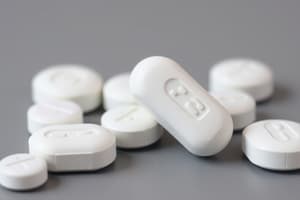Podcast
Questions and Answers
Sympatholytics are used for mild to moderate ______.
Sympatholytics are used for mild to moderate ______.
HTN
Beta blockers are preferred in ______ with CHD.
Beta blockers are preferred in ______ with CHD.
HTN
Esmolol is used for ______ emergencies with tachycardia.
Esmolol is used for ______ emergencies with tachycardia.
HTNsive
Cardioselective BBs are not used in ______.
Cardioselective BBs are not used in ______.
BBs with ISA should be avoided in ______.
BBs with ISA should be avoided in ______.
Most beta blockers have short ______ half-lives.
Most beta blockers have short ______ half-lives.
Beta blockers can cause ______ as an adverse effect.
Beta blockers can cause ______ as an adverse effect.
Beta blockers can mask the sign of ______.
Beta blockers can mask the sign of ______.
Beta blockers can cause ______ as an adverse effect.
Beta blockers can cause ______ as an adverse effect.
Stopping beta blockers can lead to ______ and angina.
Stopping beta blockers can lead to ______ and angina.
Flashcards are hidden until you start studying
Study Notes
Alpha1 Blockers
- Cause vasodilation and reduce peripheral resistance and venous return
- Cause reflex sympathetic discharge, leading to tachycardia and salt and water retention
- Have favorable effects on plasma lipids
- Used as add-on therapy for resistant hypertension and primarily in hypertensive men with BPH
- Adverse effects: hypotension (first-dose effect, 50%), failure of ejaculation, and headache
Non-Selective Alpha Blockers
- Examples: Phentolamine and Phenoxybenzamine
- Used for pheochromocytoma
- Cause postural hypotension and reflex tachycardia
Combined Alpha1 and Beta Blockers
- Examples: Carvedilol and Labetalol
- Vasodilator β [α1/β] blockers
- Effective in black patients and used for hypertension with heart failure and PVD, pheochromocytoma-induced hypertension, hypertensive emergencies, and hypertension in pregnancy
- Adverse effects: bradycardia, AV block, asthma, and hypotension
Aldosterone Antagonists
- Competitively block mineralocorticoid receptors
- Administered orally with delayed onset but long duration of action
- Marked antihypertensive action
- Prolong survival in heart failure
- Adverse effects: gynecomastia, dysmenorrhea, and hyperkalemia
Sympatholytics
- Block sympathetic neural activation
- Used for moderate to severe hypertension
- Different sites of action and toxicity:
- Centrally acting α2 agonists
- Ganglionic blockers
- Adrenergic neuron blockers
- Alpha blockers
- Beta blockers
- Combined α1 and β blockers
Beta Blockers
- Most widely used antihypertensive drugs
- Less effective in black and older patients
- Four useful antihypertensive actions:
- Decrease cardiac output
- Depress RAAS
- Reduce arterial resistance
- Suppress reflex tachycardia
- Used for mild to moderate hypertension
- Used with vasodilators for severe hypertension
- Preferred in hypertension with:
- CHD (angina, post-MI)
- Heart failure (carvedilol)
Cardioselective Beta Blockers
- Examples: Bisoprolol, Carvedilol, Metoprolol, and Nebivolol
- Used in asthma, COPD, and PVD
- Adverse effects:
- Bradycardia
- AV blockade
- Bronchoconstriction
- Mask sign of hypoglycemia
- Rebound hypertension and angina
Studying That Suits You
Use AI to generate personalized quizzes and flashcards to suit your learning preferences.




